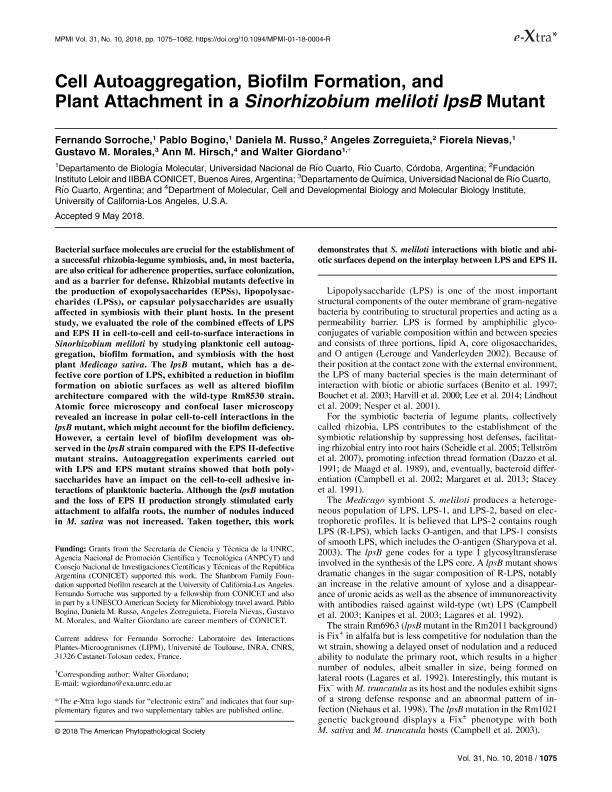Mostrar el registro sencillo del ítem
dc.contributor.author
Sorroche, Fernando Guido

dc.contributor.author
Bogino, Pablo Cesar

dc.contributor.author
Russo, Daniela Marta

dc.contributor.author
Zorreguieta, Ángeles

dc.contributor.author
Nievas, Fiorela Lujan

dc.contributor.author
Morales, Gustavo Marcel
dc.contributor.author
Hirsch, Ann M.
dc.contributor.author
Giordano, Walter Fabian

dc.date.available
2019-12-16T15:02:33Z
dc.date.issued
2018-10
dc.identifier.citation
Sorroche, Fernando Guido; Bogino, Pablo Cesar; Russo, Daniela Marta; Zorreguieta, Ángeles; Nievas, Fiorela Lujan; et al.; Cell autoaggregation, biofilm formation, and plant attachment in a sinorhizobium meliloti lpsB mutant; American Phytopathological Society; Molecular Plant-Microbe Interactions; 31; 10; 10-2018; 1075-1082
dc.identifier.issn
0894-0282
dc.identifier.uri
http://hdl.handle.net/11336/92257
dc.description.abstract
Bacterial surface molecules are crucial for the establishment of a successful rhizobia-legume symbiosis, and, in most bacteria, are also critical for adherence properties, surface colonization, and as a barrier for defense. Rhizobial mutants defective in the production of exopolysaccharides (EPSs), lipopolysaccharides (LPSs), or capsular polysaccharides are usually affected in symbiosis with their plant hosts. In the present study, we evaluated the role of the combined effects of LPS and EPS II in cell-to-cell and cell-to-surface interactions in Sinorhizobium meliloti by studying planktonic cell autoaggregation, biofilm formation, and symbiosis with the host plant Medicago sativa. The lpsB mutant, which has a defective core portion of LPS, exhibited a reduction in biofilm formation on abiotic surfaces as well as altered biofilm architecture compared with the wild-type Rm8530 strain. Atomic force microscopy and confocal laser microscopy revealed an increase in polar cell-to-cell interactions in the lpsB mutant, which might account for the biofilm deficiency. However, a certain level of biofilm development was observed in the lpsB strain compared with the EPS II-defective mutant strains. Autoaggregation experiments carried out with LPS and EPS mutant strains showed that both polysaccharides have an impact on the cell-to-cell adhesive interactions of planktonic bacteria. Although the lpsB mutation and the loss of EPS II production strongly stimulated early attachment to alfalfa roots, the number of nodules induced in M. sativa was not increased. Taken together, this work demonstrates that S. meliloti interactions with biotic and abiotic surfaces depend on the interplay between LPS and EPS II.
dc.format
application/pdf
dc.language.iso
eng
dc.publisher
American Phytopathological Society

dc.rights
info:eu-repo/semantics/openAccess
dc.rights.uri
https://creativecommons.org/licenses/by-nc-nd/2.5/ar/
dc.subject
Cell Autoaggregation
dc.subject
Biofilm
dc.subject
Plant Attachment
dc.subject.classification
Biología Celular, Microbiología

dc.subject.classification
Ciencias Biológicas

dc.subject.classification
CIENCIAS NATURALES Y EXACTAS

dc.title
Cell autoaggregation, biofilm formation, and plant attachment in a sinorhizobium meliloti lpsB mutant
dc.type
info:eu-repo/semantics/article
dc.type
info:ar-repo/semantics/artículo
dc.type
info:eu-repo/semantics/publishedVersion
dc.date.updated
2019-10-28T18:16:23Z
dc.journal.volume
31
dc.journal.number
10
dc.journal.pagination
1075-1082
dc.journal.pais
Estados Unidos

dc.journal.ciudad
St. Paul
dc.description.fil
Fil: Sorroche, Fernando Guido. Universidad Nacional de Río Cuarto. Facultad de Ciencias Exactas Fisicoquímicas y Naturales. Departamento de Biología Molecular; Argentina. Consejo Nacional de Investigaciones Científicas y Técnicas. Centro Científico Tecnológico Conicet - Córdoba; Argentina
dc.description.fil
Fil: Bogino, Pablo Cesar. Universidad Nacional de Río Cuarto. Facultad de Ciencias Exactas Fisicoquímicas y Naturales. Departamento de Biología Molecular; Argentina. Consejo Nacional de Investigaciones Científicas y Técnicas. Centro Científico Tecnológico Conicet - Córdoba; Argentina
dc.description.fil
Fil: Russo, Daniela Marta. Consejo Nacional de Investigaciones Científicas y Técnicas. Oficina de Coordinación Administrativa Parque Centenario. Instituto de Investigaciones Bioquímicas de Buenos Aires. Fundación Instituto Leloir. Instituto de Investigaciones Bioquímicas de Buenos Aires; Argentina
dc.description.fil
Fil: Zorreguieta, Ángeles. Consejo Nacional de Investigaciones Científicas y Técnicas. Oficina de Coordinación Administrativa Parque Centenario. Instituto de Investigaciones Bioquímicas de Buenos Aires. Fundación Instituto Leloir. Instituto de Investigaciones Bioquímicas de Buenos Aires; Argentina. Consejo Nacional de Investigaciones Científicas y Técnicas. Centro Científico Tecnológico Conicet - Córdoba; Argentina. Universidad Nacional de Río Cuarto. Facultad de Ciencias Exactas Fisicoquímicas y Naturales. Departamento de Biología Molecular; Argentina
dc.description.fil
Fil: Nievas, Fiorela Lujan. Consejo Nacional de Investigaciones Científicas y Técnicas. Centro Científico Tecnológico Conicet - Córdoba; Argentina. Universidad Nacional de Río Cuarto. Facultad de Ciencias Exactas Fisicoquímicas y Naturales. Departamento de Biología Molecular; Argentina
dc.description.fil
Fil: Morales, Gustavo Marcel. Universidad Nacional de Río Cuarto. Facultad de Ciencias Exactas Fisicoquímicas y Naturales. Departamento de Química; Argentina. Consejo Nacional de Investigaciones Científicas y Técnicas. Centro Científico Tecnológico Conicet - Córdoba; Argentina
dc.description.fil
Fil: Hirsch, Ann M.. University of California at Los Angeles. School of Medicine; Estados Unidos
dc.description.fil
Fil: Giordano, Walter Fabian. Consejo Nacional de Investigaciones Científicas y Técnicas. Centro Científico Tecnológico Conicet - Córdoba; Argentina. Universidad Nacional de Río Cuarto. Facultad de Ciencias Exactas Fisicoquímicas y Naturales. Departamento de Biología Molecular; Argentina
dc.journal.title
Molecular Plant-Microbe Interactions

dc.relation.alternativeid
info:eu-repo/semantics/altIdentifier/url/https://apsjournals.apsnet.org/doi/10.1094/MPMI-01-18-0004-R
dc.relation.alternativeid
info:eu-repo/semantics/altIdentifier/doi/http://dx.doi.org/10.1094/MPMI-01-18-0004-R
Archivos asociados
